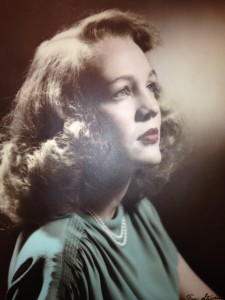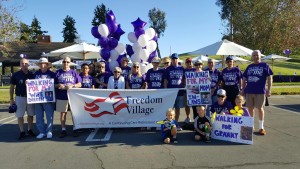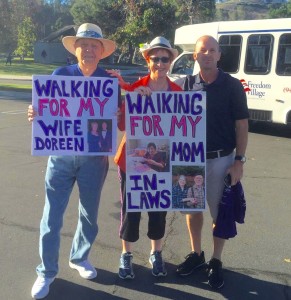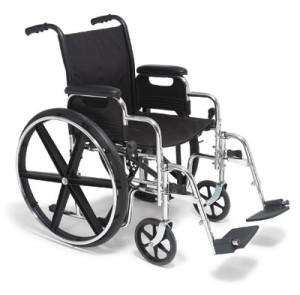
by Diane Masson | Nov 1, 2015

You know who they once were better than anyone! Be the best advocate you can be!
Here are some tough statements that family members can hear at an Alzheimer’s or dementia care conference for their loved one (who might be residing in assisted living, memory care or skilled nursing care):
- She can’t direct her own care…
- Is regularly disoriented…
- Needs full help with bathing and dressing…
- She can become frustrated…
- Can be resistant to care…
- Does not always remember to use her walker…
It can proceed into an in-depth conversation about the ability of your loved one’s communication:
- She is not very verbal…
- She has improved in the last four months from not speaking at all (because she was still coming off of the psychotropic medications) to being a little more verbal.
- The staff has to use phrases or questions that are seven words or less to create less confusion for her.
- The staffs’ goal is to elicit a “yes” or “no” response, so she can make choices.
Then a group discussion can proceed about who she can still recognize and if she can still call anyone by name (this is tough one):
- Does she recognize you?
- She thinks her daughter is her sister.
How much food is or is not consumed?
Our family has experienced witnessing continual weight loss of my mother-in-law for 10 months. She is eating 50% of her food, but can pop out of her chair and start wandering sporadically while dining. She walks almost continually. The staff have problem solved this by feeding her in the country kitchen instead of the dining room to increase her food intake.
What should you ask in a care conference? Don’t be intimidated; no one knows your loved one better than you. Be his or her advocate to the best of your ability.
- Find out exactly what medication they take and why. Sometimes they were given a medication like a psychotropic in the hospital and no one is paying attention to the fact it is not necessary anymore.
- How much exercise or movement do they experience? Staying mobile is important.
- Inquire about live entertainment. Your loved one may be refusing to go to live entertainment and you know they love music. The only reason they may be refusing is because they can’t HEAR the caregiver asking them to go. Maybe the caregiver needs to speak up or…
- Ask about music therapy. It can be very affective for dementia and Alzheimer’s. If they tried it once and it was refused, try again. Every day is a new day. Seniors with dementia (such as my mom) can be more receptive and oriented in the morning.
- How much food do they eat? Maybe they are not eating because they have lost teeth (this happened to my mom)? Food adjustments can be made.
Is there anyone else out there dealing with a parent who has dementia? It is not easy. What tips can you share?
Diane Masson advocated for her mom who had dementia for nine years and her mother-in-law currently lives in a memory care community. Diane writes a Tips2Seniors blog every week and published a book to take the guess work out selecting senior housing before, during or after a health care crisis, “Your Senior Housing Options.” She has worked in senior housing for 17 years and her first book, “Senior Housing Marketing – How to Increase Your Occupancy and Stay Full,” is helping senior housing professionals on a nationwide basis.

by Diane Masson | Oct 25, 2015

Residents and staff from Freedom Village in Lake Forest walking for Alzheimer’s!
If enough of us keep walking and raising funds for Alzheimer’s we will eventually find a cure for this detrimental disease that affects so many seniors including my mother-in-law.
Almost $110,000 was raised by 741 walkers at the Laguna Niguel Alzheimer’s Walk on October 24, 2015. It was my first time raising awareness for Alzheimer’s in California. I was part of team Freedom Village (a Continuing Care Retirement Community in Lake Forest) who came in seventh for fundraising.
My mom had dementia for nine years and died in April. I watched the disease rob her of the ability to communicate. Her last and final roommate in skilled nursing was a wonderful woman who is still battling Alzheimer’s. I rode the bus to and from the Alzheimer’s walk with her husband. He shared the struggle of trying to keep his wife independent as long as possible. He had alarms on the doors to wake him if she tried to wander off in the night. Eventually, those alarms where not enough to contain her at night. He had to find her a safer home.
 This brilliant husband took his wife one day a week to Silverado memory care to participate in activities. After several months he increased it to two times a week. She was so comfortable there that she would walk in and immediately be engaged with a staff person and walk to an activity. Then the decision was finally made to make it a permanent move. This time the community recommended that he not return for one week, so that his wife could adjust. She did adapt. In her three years at the community, she never asked once to go home.
This brilliant husband took his wife one day a week to Silverado memory care to participate in activities. After several months he increased it to two times a week. She was so comfortable there that she would walk in and immediately be engaged with a staff person and walk to an activity. Then the decision was finally made to make it a permanent move. This time the community recommended that he not return for one week, so that his wife could adjust. She did adapt. In her three years at the community, she never asked once to go home.
At the walk, I learned that Alzheimer’s affects more women than men. It was a beautiful experience to walk side-by-side with other people that have been touched by this mind-altering disease. People carried blue flowers if they had Alzheimer’s. I carried a purple flower because my mom died from dementia. Other colors of flowers that people carried signified being a caregiver or financial supporter of Alzheimer’s.
All the Freedom Village residents and staff had a blast. Imagine what we can do next year in group participation and fund raising. We will build on our momentum and team enthusiasm from our first annual walk for Alzheimer’s.
How have you raised awareness for Alzheimer’s? Let’s keep this conversation going on social media to find a cure soon.
#Walk2EndALZ #freedomvillagelakeforest #silverado
Diane Masson is a sought after author, blogger, speaker and regional marketing director. She is very passionate about advocating for seniors on a nationwide basis and educating them about their future choices. She just published a book to help seniors take the guess work out of selecting senior housing options or staying home. It is called, “Your Senior Housing Options.” Her other book has been popular with senior housing professionals on a nationwide basis. It is called, “Senior Housing Marketing – How to Increase Your Occupancy and Stay Full.” You can contact her through her website at tips2seniors.com.

by Diane Masson | Oct 11, 2015
 After 200 blog posts of new content supporting the senior housing industry, why am I suddenly cast aside by LinkedIn? Do you think it is fair? In four years, I have helped tons of LinkedIn users join groups and now the groups shun my blogs?
After 200 blog posts of new content supporting the senior housing industry, why am I suddenly cast aside by LinkedIn? Do you think it is fair? In four years, I have helped tons of LinkedIn users join groups and now the groups shun my blogs?
Why?
LinkedIn and their groups have new rules to stop people from shamelessly promoting themselves. Did LinkedIn protect my quality content when people replied on LinkedIn to my posts with their own self-promotions rather than addressing the question at hand? No!
Why is LinkedIn shunning me now? It’s because I am trying to provide resources to benefit the senior housing industry and seniors through links in my articles.
- One link was to my published book that can benefit seniors and Boomer children in evaluating retirement options. Every human on this planet knows someone who could be helped by learning about, “Your Senior Housing Options.” This is a resource not self-promotion! It took me a year and a half to write it on Saturdays, while I worked full time. I paid my own money to publish this book, because I felt the message would help seniors have a better quality of life by planning ahead.
- Another link was to my YouTube TV interviews. Every video contains an educational resource topic and explains solutions for seniors and family members in crisis mode. One video is about understanding the differences between a senior staying home and paying a caregiver to help take care of them versus moving to assisted living. Another video explains the differences between rental retirement communities and Continuing Care Retirement Communities. How is this self-promotion?
The largest 55 plus community in California thought my information was of value to seniors and published my information and resources on the front page of their publication.
A radio station offered me a 15 minute interview and found the information for seniors to be so helpful that it turned into 30 minutes and another interview is already scheduled.
What is my goal? I want to bring a message to seniors across this nation that they should plan ahead instead of waiting for a crisis. Why? Because I have been working with seniors for 19 years both personally and professionally. My own mother planned ahead at age 75 and my in-laws waited for a crisis. They could not leave their home, so our family has been living in crisis mode for 10 months. My poor mother-in-law with dementia has never been the same since a hospital put her on psychotropic medications during this crisis.
Seniors need to understand the costs and consequences of waiting for a crisis. Every senior has a right to know what their choices are before a health care crisis strikes them.
There will be no links in this article to see if LinkedIn publishes me this week. Please comment if you agree that my links are resources and please comment if you disagree.
Please like this article if you found it of value and pass it on to your friends through social media. If you like what I talk about, then sign up for my weekly newsletter. You may not see me on LinkedIn in the future. Every single one of us knows a senior who has waited too long, so help educate a senior on how to plan ahead today.
Sincerely, Diane Twohy Masson

by Diane Masson | Oct 4, 2015
 First, plan ahead and know that every senior has a 66% chance of needing assisted living or skilled nursing in the future.
First, plan ahead and know that every senior has a 66% chance of needing assisted living or skilled nursing in the future.
Second, do not rely on the verbal promises of senior housing sales people. Read the agreement for services or contract. If a senior does not understand it, they should ask a savvy friend or hire an attorney to help them. The majority of retirement counselors are honest and passionate about serving seniors. A few will say “anything” to get a senior to move in immediately.
How do you know if a retirement community will really take care of you or not in your future? Here are some important questions to ask EVERY senior housing community BEFORE you move from your home:
What happens when a senior needs a higher level of care like assisted living or skilled nursing?
- Will the senior be asked to leave the retirement community?
- Do they offer a higher level of care on the same campus? How much does that cost per month?
- Does an outside company bring caregivers into the senior’s apartment home to provide care? What is the hourly cost? What is that company’s reputation?
What happens if a senior falls in the middle of the night?
- Is there an emergency call system? Who responds to it? Are they medically trained?
- What happens if a senior falls and he or she can’t hit the emergency button? Will they will be found in a timely fashion?
- Is there a daily check in system?
What happens if a senior outlives their resources?
- Will they kick you out? A senior provider kicked out a senior in Houston a week ago.
- Is there a Good Samaritan Fund or Foundation to help a senior so that he or she won’t get kicked out? Is there a limit of how many seniors can be utilizing the fund at any one time?
- Or is there just a flat guarantee of care in writing that a senior will never be kicked out unless they divest their own funds on purpose by giving gifts to their children?
What else should a senior ask in order to make a good move?
These are just some of the intelligent questions that seniors should ask a senior housing provider. Other tips and advice can be found in Diane Masson’s new book, “Your Senior Housing Options.” She has recently been interviewed for TV, radio and newspaper features. Diane Masson has worked in all types of senior housing in her 17-year career. Her first book, “Senior Housing Marketing – How to Increase Your Occupancy and Stay Full,” is being utilized by senior housing professionals around the world.

by Diane Masson | Sep 20, 2015
 If an aging senior has a new health diagnosis or is getting frail, what might happen in his or her future?
If an aging senior has a new health diagnosis or is getting frail, what might happen in his or her future?
Many seniors don’t realize that senior living communities often have minimum health requirements. If you have a diagnosis of a progressive disease, you may not qualify for certain types of housing. If you are in the later stages of Alzheimer’s, you may only qualify for memory care or skilled nursing care.
It is illegal for a senior housing care provider to let you move in and not be able to provide for your needs. Many seniors are stunned when they arrive at an independent senior living community to be told they have bypassed an independent living setting and that an assisted living community would provide a more appropriate level of care for them.
The conversation that a retirement counselor in a senior housing community dreads most is “the talk” with a future resident. As I write this, one Continuing Care Retirement Community (CCRC) that I work with had to turn down two senior applicants in the last six weeks. One applicant had a diagnosis of dementia and could not manage alone, and the other was too frail for independent living. Even though those seniors thought they were fine to move into independent living, they only qualified for assisted living.
Other CCRCs I worked with in the past would deny people admittance if they had ever had cancer, Parkinson’s, Alzheimer’s, multiple sclerosis, or anything that would send them quickly into a higher level of care for an extended period of time. How can they do this, you might ask? Well, it is a contract for services, and as long as they are consistent with all applicants, this is considered consistent with fair housing practices.
The proceeding has been excerpt from my new book, “Your Senior Housing Options.”
Have you ever heard of denying a senior (in a wheelchair) admittance into a retirement community? A senior prospect (in a wheelchair) said it happened to them at several communities. How can this be?
“Your Senior Housing Options,” has a simplistic title, but what’s inside this new book can save a you months of research time. Hear Diane Masson’s interview of how her mother and in-law’s faced the pivotal decision to plan ahead or wait until a crisis. Learn the pitfalls from transitioning from your home to senior housing. Understand what questions to ask, insider tips and dirty secrets revealed. For weekly tips join at: Www.Tips2Seniors.com
Diane Masson has worked in senior housing for 17 years and is the regional marketing director for two debt-free Continuing Care Retirement Communities in Southern CA (Freedom Village in Lake Forest and The Village in Hemet). Her first book “Senior Housing Marketing – How to Increase Your Occupancy and Stay Full,” is being utilized by senior housing professionals across the country. Both her first book and second book, “Your Senior Housing Options,” have a 5-star rating on Amazon.com.






